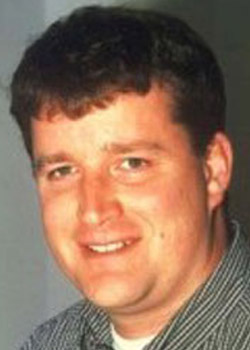Jeff Moersch
Scrap

Jeff Moersch
My formal training as a scientist began with a Bachelor’s degree in Physics (Cornell), followed by a Master’s in Geology (Arizona State University), a Master’s in Astronomy (Cornell), and a Ph.D. in Astronomy (Cornell). After grad school, I worked for two and a half years in the Exobiology Branch at NASA Ames Research Center as a Resident Research Associate of the National Research Council. In June, 2000, I moved to a research faculty position in the (then) Department of Geological Sciences at U.T. My appointment as Assistant Professor in the Department of Earth and Planetary Sciences at U.T. begins in August, 2003.
My research interests can be divided into two broad categories related to planetary geology and remote sensing: First, I am interested in using the clues provided by Martian geology to understand Mars’ present and past surface environment and its potential for having once harbored life. For example, I work with infrared spectroscopic and imaging observations of the Martian surface to understand its mineralogic composition, which in turn can tell us about things like the presence or absence of liquid water on the surface in the past. The second broad category of my research deals with the technical aspects of building new science instruments for use on planetary spacecraft missions and optimization of the science yield from instruments in new operational environments.
Much of my work involves planning, acquisition, and analysis of data by orbital and surface-based spacecraft at Mars. My involvement with NASA spacecraft missions began when I was a student, working on the Voyager 2, Galileo, and Mars Observer missions. As a professional scientist, I’ve served as a Science Team Member on the Deep Space 2/Mars Microprobe mission, the Mars Odyssey Mission, and the Mars Exploration Rover mission.
I place a large emphasis in my research on the ground-truth knowledge that can be gained from work on the Earth. This includes remote sensing and field studies of terrestrial analogs for Martian geologic features, and participation in Mars rover mission simulations on Earth, which teach us how to effectively use robots to do field geology. Laboratory spectroscopic studies and telescopic observations are other techniques I have employed over the course of my career to round out my approach.
One of the most enjoyable aspects of my work is that it tends to be very interdisciplinary, so there are ample opportunities for me to learn new skills on every project. Cutting-edge technology is part-and-parcel of the work, which suits my gadget-oriented personality well. The very best part of my job is the feeling of exploration that comes from seeing a new corner of the solar system for the first time whenever one of our missions succeeds.
Contact
Phone: 865-974-0371
Email: jmoersch@utk.edu
Professional Website: eeps.utk.edu/person/jeff-moersch/
Research Interests
Planetary surfaces; Unmanned spacecraft exploration of the Solar System; Remote Sensing; Terrestrial analogs for planetary surfaces; Instrument development; Exploration science and methodology.